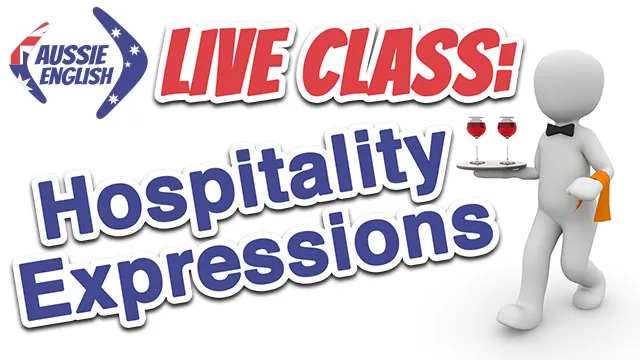Ep060: Expression – To Nail Something/It
In today’s episode, Ep060: Expression – To Nail Something/It, I teach you how to use the common English expression “To nail something” or “To nail it”.
Ep060: Expression – To Nail Something/It
G’day guys. Welcome to this episode of Aussie English. Today’s another expression, and this is an expression that I use all the time, and I’ve actually caught myself using it a number of times in previous episodes. So, I thought that it would definitely be something that I should go over, that I should teach you, that I should show you and break down, and show you how to use it, ‘cause it is one of those more slangy kind of expressions, but it’s common everywhere now in English. I think it originated from America and it would’ve been on American TV and so it’s just become popular everywhere. I’m sure people in England would know it, people in the US and Canada would know it, and it’s definitely used everywhere in Australia.
So, the expression is “To nail something”, “To nail something”. And it’s often just “to nail it”. You would say, “To nail it” if um… you already know what “It” is that you’re already talking about in conversation. You can say “You’ve nailed it” or “To nail it”.
So, literally, what does “To nail” mean? The verb “To nail something” is used to refer to hammering a nail, and “a nail” is a small thin piece of steel or metal of some kind that you would hit with a hammer into a piece of wood quite often to sort of fasten something somewhere. So, if you were building say a deck, which is something in front or behind of your house made of wood that you can walk on and have a barbecue on, and have seats on. It’s made of wood. If you were hammering the wooden pieces, the wooden planks, into place, you would be hammering nails. You would be nailing it down. You would be hammering nails through the wood and fastening the wood there. So, that’s “to nail”. Literally, “to nail something” is to hit a nail through it. So, you can nail a sign to a post, or you could say that Jesus was nailed to the cross. They pushed… they pushed… they hammered nails through his hands and his feet into the cross to fasten him to the cross. So, that’s to nail.
However, figuratively, I would use it more often in a figurative sense, because it’s just something I would say quite often when I use the word “nail”. And if you nail something or you nail it in a figurative sense it means that you have completed a task successfully, perfectly, impressively, or you’ve gotten something correct, you know, you’ve gotten something right.
So, what do I mean by this? I’ll run you through a few examples.
So, for example you’ve just had an exam, and you’ve come out of the exam, you’ve said to your friends, you know, “I think I did really well. I answered all the questions. I felt like I knew every single thing that the exam was asking, and I had enough time. I did really well. I finished ahead of time. I left. I feel like I nailed it. I feel like I nailed the exam. I nailed it.” And that would mean that you felt like you did incredibly well, you know, almost too well. That you’re going to get a really really high score. It was too easy. You nailed it.
Another example could be that a teacher asks a student a question in the classroom, and the student answers the question perfectly. You know, it’s a maths question for example and they give the exact answer. The teacher could say, “Well done” to the student, “You nailed it. You nailed the question. You got the question correct. It was perfect. You were successful. You nailed it!”
Another example could be that you’re learning how to pronounce a word, and I think this is where I’ve used this [expression] many other times in the podcast when I’m talking about pronunciation. You’re trying to, sort of, perfect or to successfully pronounce a word in a foreign language say, Australian English or English, you could say the process of trying to get the pronunciation perfect is something that you are trying to nail. So, you’re trying to nail the pronunciation, which means that you’re trying to get the pronunciation perfect. You’re trying to do it incredibly well. And you could also say that once you get the pronunciation correct, and you get it correct every time, that you’ve nailed it. You nailed the pronunciation. So, you’re trying to pronunciation, you’re trying to learn the pronunciation, you’re trying to get it right, and then when you do get it right, and you get it right every time, you could say then “I’ve nailed it. It’s too easy. I’ve nailed it.”
One last example could be that someone is auditioning for a part as an actor, say in a big film, you know, say Game of Thrones, say a new blockbuster that’s coming out next year in Hollywood. They go in. They do the audition, but they come out and they don’t feel like they did very well. So, they don’t think that they’ll get the part. So, they could come out and they could say to their friends and family, “Unfortunately I don’t think I nailed the audition.” So, you can use it in that opposite respect. You can either nail something or you can not nail something. So, you can say, “I don’t think I nailed it. I don’t think I did very well. I don’t think I did it perfectly. I don’t think I was successful. I don’t think I nailed the audition”.
So, now let’s do some exercises just to practice our pronunciation guys. And I’ll just run through the phrase “To nail it” five times for you. And then I’ll run through the conjugation of the past tense, “I nailed it”, through all the different ah… pronouns.
To nail it x 5
To nail something x 5
I nailed it
You nailed it
He nailed it
She nailed it
We nailed it
They nailed it
So, that’s the episode for today guys. See if you can listen multiple times, and see if you can nail the use of the expression “To nail something” or “To nail it”, and then practice the pronunciation and see if you can nail the pronunciation of “To nail it” or “To nail something” and try and nail the conjugation. So, hopefully I’ve used the phrase “To nail” enough times that you will definitely remember it and definitely understand it in the future when you hear it. And hopefully you’ll nail it in the future and use it yourself when you’re speaking English. All the best guys and I’ll see you soon.
Here's what you get when you sign up!
- Read while you listen using the Premium Podcast player.
- Understand every word in every episode.
- Download all PDF transcripts and MP3s for 600+ episodes.
- Get access to bonus member-only episodes.












Responses